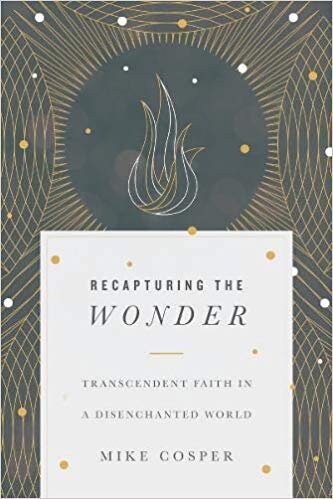Book Review:
Recapturing the Wonder
This book review was included in the December 2019 Meadowcroft Monthly. For an archive of all book reviews, click here.
Do you ever feel a little bit alienated from the experience of your faith in Jesus? Do you ever feel you are “able to articulate the doctrine and dogma of the gospel,” but feel like you’re “doing so from the outside looking in”? I know I often feel this way - and so does Mike Cosper. So he wrote a book about it, Recapturing the Wonder.
Cosper starts with the premise (well-founded, I believe) that we are living in a disenchanted age. He borrows this phrase from an author named Charles Taylor and says, “a disenchanted world has been drained of magic, of any supernatural presences, of spirits and God and transcendence. A disenchanted world is a material world, where what you see is what you get.”
This outlook affects all of our lives, meaning it can even affect our reading of the Bible. This can cut two ways - For one, we can take the “liberal” route and just strip the Bible of all of its supernatural qualities - explaining away miracles, etc. That might not be an issue for many of us, but the second way that disenchantment can affect us might be more relevant, where “the authority of the Bible is maintained, but the Bible must act like any other modern text - like a text book or the instruction book that comes with a cordless drill.” We need to see that the Bible is so much better than this. Instead, he says, “we need a way of thinking about the Scriptures that allows us to come to it as whole persons - who think, feel, and imagine - and find nourishment on all levels.”
Cosper brings this home by pointing out that we feed into our disenchantment because “we have embraced ways of living - habits, practices, and stories that we’re often unaware of - that prime us for disbelief and doubt.” These practices are compounded when we apply them to social media (“That's the dirty secret of social media; we can't capture a moment without molesting it first.” - ouch!).
To fight all of this, we need to go back to the idea made (quasi) famous by John Calvin - which Cosper points to in saying - “there is no knowledge of God without knowledge of self. In knowing ourselves, in laying down the artifice and pretense that life in the world both invites and imposes, we see the depths of our need for grace. But we can also find a God who knows it entirely, loves us entirely, and invites us to rest”
Along the way, Cosper offers several concrete strategies for “re-enchanting” our world. He details practices including breath prayers (where you pray short prayers the length of a breath), fasting, feasting, and generosity. You might not want to embrace all of his practices (what he and others call a “rule”) but there are probably some good suggestions here that can help you along the way.
When it come to the idea of fasting, Cosper makes a really provocative observation about the famous story of Jesus’ temptation in the wilderness:
Notice that when the devil came to tempt Jesus, he only came after Jesus had spent forty days in solitude. Some read this and think the devil was being opportunistic, attacking Jesus only after the pressures of the desert and fasting had weakened him. I don't think that's true. Unbeknownst to the devil, he tempted the Son not at his weakest but at his strongest. He was not tempted by bread because for forty days, he'd learned to live without it. Likewise, the adoration of the crowds and the lust for power had no appeal either.
For a couple of months, Jason Kirwan had been bugging me to read this book. And I don't want him to get too big of a head about this, but he was right - it’s outstanding. Especially in our reformed circles, it’s possible for disenchantment to become a real problem. So - I highly recommend you pick up this one and read it.
